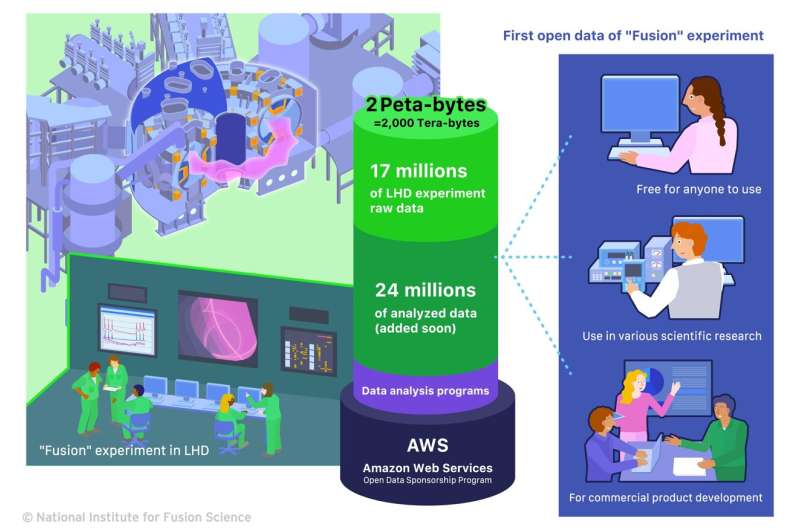All diagnostic and analyzed data of LHD, having more than 40 million items and 2 petabytes in total, are open to the public on AWS's cloud storage. Credit: National Institute for Fusion Science
High-temperature fusion plasma experiments conducted in the Large Helical Device (LHD) of the National Institute for Fusion Science (NIFS), have renewed the world record for an acquired data amount, 0.92 terabytes (TB) per experiment, in February 2022, by using a full range of state-of-the-art plasma diagnostic devices.
The International Thermonuclear Experimental Reactor (ITER), which is currently under construction in France through the international collaboration of seven parties, is expected to generate approximately 1 TB of data per experiment in 10 years, and LHD is currently the only experiment in the world that produces data closely aligned to ITER.
The promotion of "Open Science," in which large-scale research data assets are utilized and shared across society, was adopted as a joint statement at the G7 meeting held in Sendai, Japan in 2023. NIFS started full-fledged efforts toward Open Science by establishing the "Open Access Policy" in February 2022 and the "Research Data Policy" in October 2022.
Since 2023, all the data obtained from LHD experiments are open to the public immediately after acquisition and analysis is completed. All computing program source codes for data analysis are also openly available.
In Open Science, the FAIR Principle is regarded as an important indicator. NIFS considers the fulfillment of the FAIR requirements in diagnostic raw and analyzed data, i.e., valuable digital assets of the LHD project, to be an important proposition of the LHD Academic Research Platform and continues its efforts.
Although LHD experiment data has become one of the world's largest data assets and is widely used by domestic and international fusion plasma researchers, it has been seldom used for other purposes such as in different research fields or in industry. This may be due to 1) the difficulty of finding the data of interest from a wide variety of experiment data, and 2) the enormous number and the huge size of individual data, which make it difficult to start data analysis easily and quickly.
In order to solve these problems, it is expected that 1) a comprehensive, bird's-eye view of huge amounts of experiment data are enabled, and 2) the data-analysis environment can be easily prepared to start analyses instantly, and data computing resources can be increased or decreased as necessary.
Research achievements
LHD experiment data is a large-scale digital asset. To promote its use by researchers in different fields, industry, and the general public, a computer environment that can be easily used by anyone is necessary. An important possibility exists in "cloud services" technology.
Cloud services provide an environment in which data analyses can be started immediately, enabling researchers, industry, and even citizen users to make use of data very effectively. Now, NIFS has been adopted for the "Amazon Web Services (AWS) Open Data Sponsorship Program", and has completed the data transfer of about 2 petabytes of LHD experiment data onto AWS's cloud storage, Amazon Simple Storage Service (Amazon S3), to make them freely accessible to anyone on the Internet.
A computing environment capable of running a suite of data analysis programs is also indispensable for the utilization of vast open data. LHD data replicated entirely on AWS's cloud storage can now be accessed directly from AWS cloud computers for high-performance, massive data analyses at any time.
It is also a major advantage for the promotion of Open Science that Amazon S3 enables us to provide a reliable, nonstop data service, independent of the NIFS system and network capabilities.
Unlike other research fields, such as global environmental, meteorological, and astronomical observations, where international research data sharing has already been taking place for more than a few decades, there has been little international data collaboration or sharing in fusion energy research and development, especially in the experimental field.
More information: National Institute for Fusion Science releases approximately 2 petabytes of data from 25 years of Large Helical Device (LHD) experiments as open data on AWS.
Provided by National Institutes of Natural Sciences
























